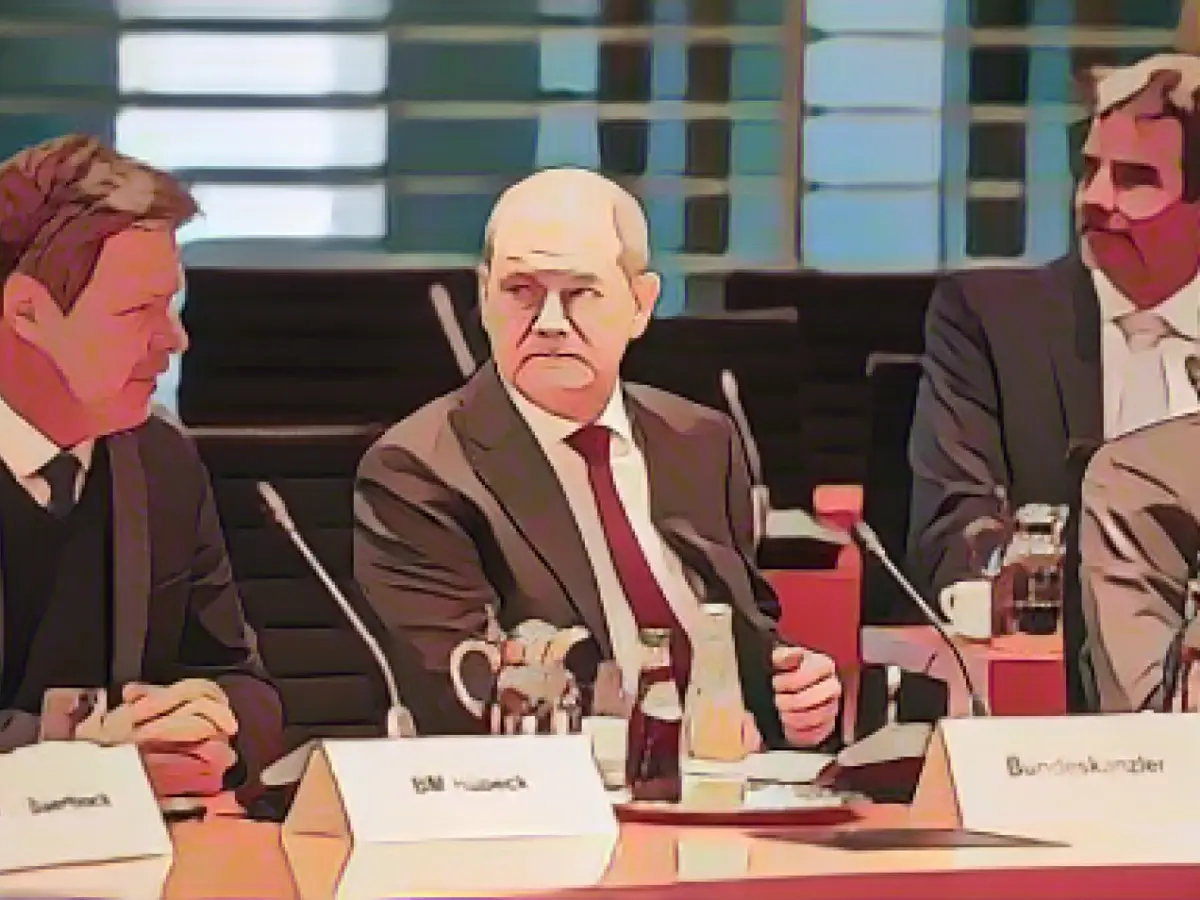Budget Battle in Germany's 2024 Budget Talks
Germany's three-headed coalition government, spearheaded by Chancellor Olaf Scholz (SPD), Economics Minister Robert Habeck (Greens), and Finance Minister Christian Lindner (FDP), is locked in a budget standoff for 2024. Negotiations have stalled, with a potential resolution expected on Wednesday, as per dpa sources.
Green Party Chairwoman Ricarda Lang, in a BR interview, stated that a new draft budget might not be approved during the cabinet meeting on Wednesday. However, she anticipates a swift political decision. The initial intention was to seal cabinet approval by year-end. But an alternative method, the circulation procedure, which involves the Bundestag and Bundesrat, is also under consideration.
Lengthier negotiations might lead to an emergency Budget week in the Bundestag before Christmas, and approval in the Bundesrat is slated for December 22. Chancellor Scholz, Habeck, and Lindner have identified a budget shortfall of 17 billion euros for the forthcoming year, partly due to the Karlsruhe budget ruling and the impact on credit-backed special funds. The focus now is on trimming costs in various sectors and the possibility of reinstating the debt brake suspension for 2024.
Related Developments
- The budget impasse in Germany can be linked to the debt brake rule, a constitutional provision limiting the central government's budget deficit to 0.35% of GDP. This rule, a contentious issue due to significant investment demands in sectors like infrastructure, digitalization, and defense, brought about a coalition collapse in November 2024.
- Finance Minister Lindner's refusal to suspend the debt brake sparked opposition from Chancellor Scholz and Habeck, leading to Lindner's dismissal and the coalition's downfall. Germany has been grappling with a two-year recession, exacerbated by structural issues like declining competitiveness due to reliance on Russian energy and heightened competition from China.
Potential Responses
- Rejuvenating the Debt Brake:
- Temporary Suspension: Some advocate temporarily suspending the debt brake by employing constitutional exemptions for extraordinary crises. This would only require a simple majority, but carries legal risks if deemed disproportionate.
- Specialized Expenditure Envelopes: Another approach involves creating specialized expense envelopes exempt from the debt brake, requiring a two-thirds majority in both houses.
- Loosening Investment Limitations:
- The SPD and Greens advocate for enhancing the debt brake by excluding investments from its constraints. However, defining investment types could be challenging.
- Creating a Special Fund:
- Both the SPD and Greens propose setting up a non-regulated "special fund" for expenses in defense, infrastructure, education, and environmental protection.
- Expanding Fiscal Flexibility:
- Raising the structural deficit limit, contingent on the overall debt/GDP ratio, can offer additional fiscal leeway. For example, the Bundesbank suggests raising the structural deficit to up to 1% of GDP, releasing approximately €30 billion annually.
Upcoming Challenges
Prioritizing public investment and supporting low-income households and economic growth is crucial in Germany. Identifying and implementing appropriate measures to minimize the budget impact, tackle structural challenges, and promote a strong economic rebound are vital.
Enrichment Insights
Several approaches are being considered to address the budget deficit in Germany's 2024 budget and foster economic growth, taking into account the debt brake rule and ongoing negotiations:
- Relaxing the Debt Brake:
- Temporary Suspension: Citing constitutional exemptions for extraordinary crises.
- Carve-Out Expenditure Envelopes: Requiring a two-thirds majority in both houses of federal parliament.
- Easing Investment Constraints:
- Investment Exclusions: Defining investments could be problematic.
- Setting up a Special Fund:
- Exempt from debt regulation.
- Increasing Fiscal Room:
- Raising structural deficit limits.
- Infrastructure Investments and Stimulus Packages:
- Transportation, digitalization, energy, and defense.
- Tax Reforms and Government Spending Restructuring:
- Cutting subsidies and reforming social security systems.
- Raising taxes on high-income earners and wealth-related assets with caution to avoid hindering growth.








